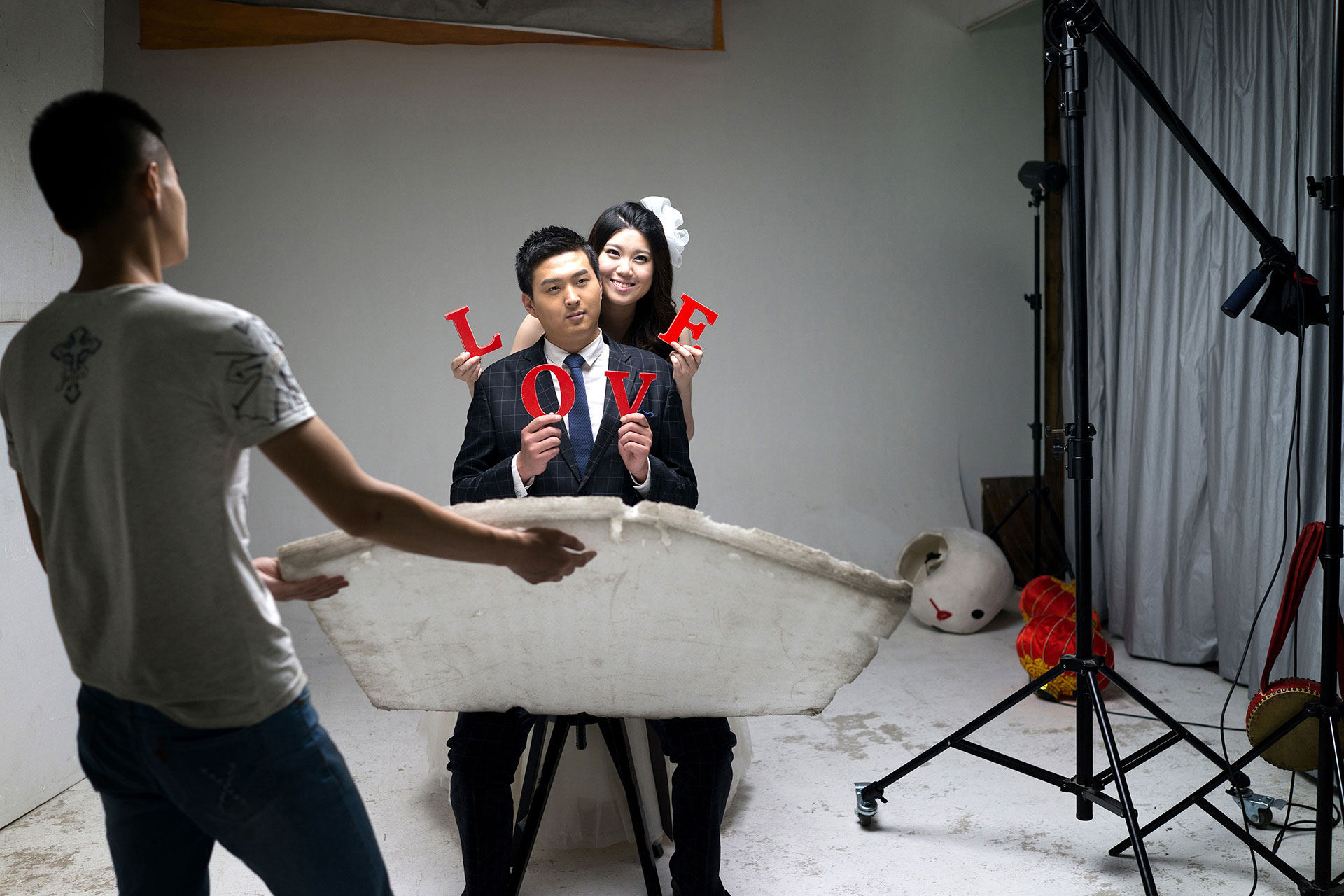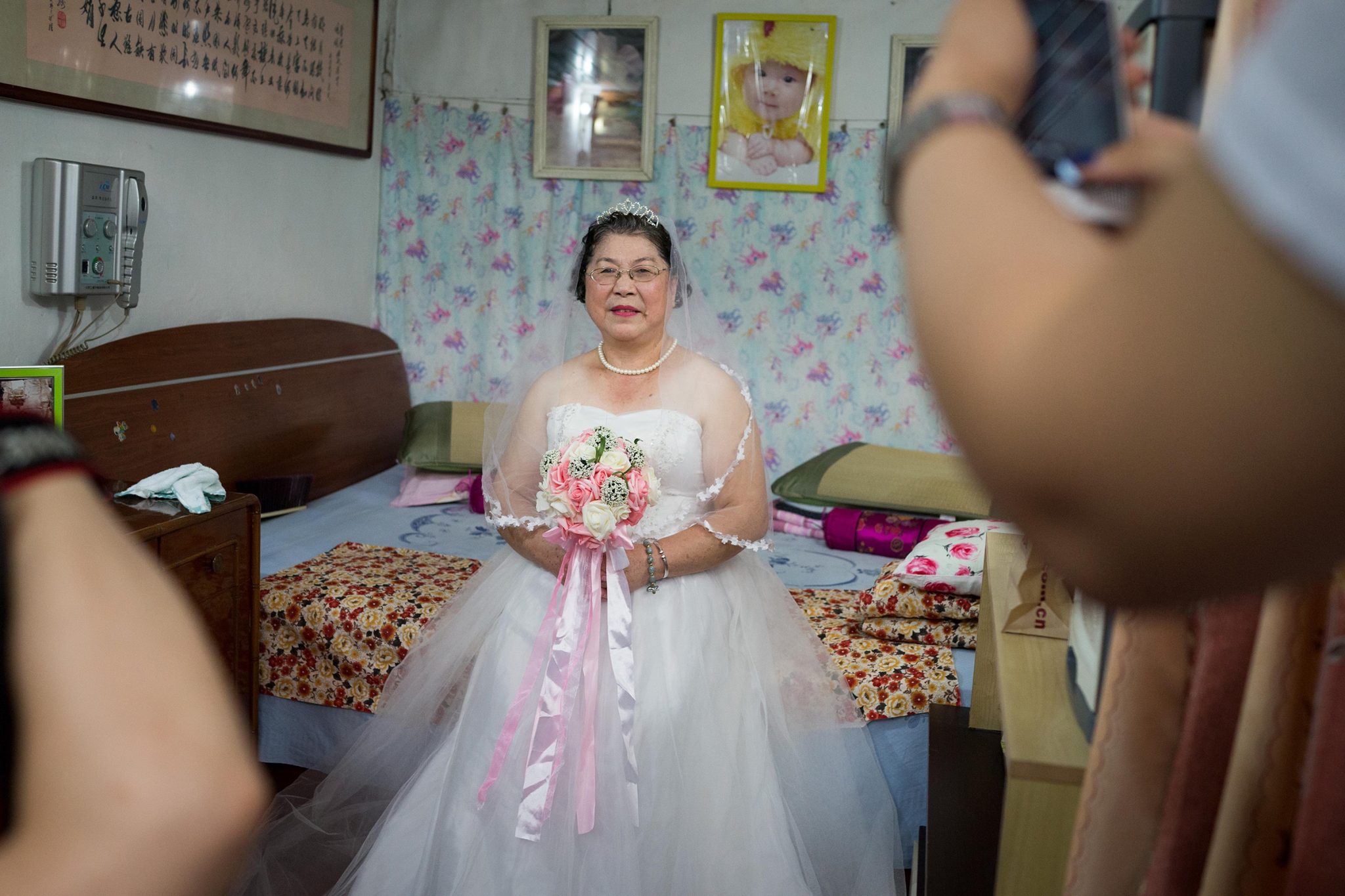Love, captured: China’s billion-dollar pre-wedding photo industry

China Love, a documentary released last year by Australian filmmaker Olivia Martin-McGuire, takes a close look at China’s pre-wedding photo industry. We meet couples young and old who celebrate love while also being honest about their anxieties. What if, the second the shutter snaps, is the best moment of their life?

Planning a wedding can be the most stressful task of a couple’s life. And if you’re a couple in China, you have one extra obstacle on your way to holy matrimony: the pre-wedding photo.
Giant photo studios now populate the streets of every major Chinese city. Within these walls are closets filled with designer wedding gowns, elaborate fairytale sets that would be the envy of a Hollywood director, and in-house photoshoppers who work tooth and nail to polish every pixel. These shoots result in larger-than-life photos that showcase a couple glowing in the center of a magical, fake world.
The documentary China Love, released last year by Australian filmmaker and photographer Olivia Martin-McGuire, digs deeper into these fantastical images, from the days of the photoshoot to the aftermath, when the photos are hung and the wedding is over. It is a keenly observed debut from Martin-McGuire, an expat in China. She deftly explores the photoshoot industry by following a few couples about to get married. Individual stories are put into the cultural context of the Cultural Revolution, which marks a clear divide between two generations: those who have the chance to take wedding photos and those who did not.
China has grown rapidly since the Cultural Revolution. What was once a closed-off country where people were grateful to live modestly is now an international mecca for commerce. Western concepts have infiltrated China’s everyday culture, one of them being an overt performance of capital-R Romance.
In the past, Chinese people dismissed public displays of affection. They were seen as a mark of vanity. As a result, older Chinese couples are often very private about relationships. However, the younger generation, one that has been influenced by stereotypically Western ideas of romance, have started to embrace these more elaborate performances of love that are closely linked with wealth. As the country and its people have gotten richer, Chinese people have started to celebrate love through material possessions, such as new houses, vacations, and glamorous wedding ceremonies. During the Cultural Revolution, vanity was the enemy. Now, it’s the marker of success within a family, a society, and an economy.
Through China Love, we meet a cast of couples that showcase different facets of contemporary love and marriage in China. There is Li and Jun Bo, who are set up by a matchmaker. This couple, who seem to lack passion and romance, decide to get married over text. They are from a more rural part of the country, but still put great effort and lots of money into their wedding photos. The photos are blown up and hung all over their new home, and serve as their only decorations. We also meet Will and his persnickety fiancé Viona, who tirelessly argues, fights, and barks for the perfect image. We learn that her brattiness over the photoshoot disguises a heavy anxiety: that the second the shutter snaps will be the best moment of her life. And of course, there are couples from the older generation, who are not customers but spectators. Peipei and Xuezhong were married during the Cultural Revolution and had to bike 12 kilometers to have their only wedding photo taken: a single passport-style black-and-white photo showing the young couple shoulder to shoulder. Through them, we watch love that’s simmered like stew, becoming a rich and complex substance that can only be achieved through time and loyalty.
China Love also introduces us to one powerful individual: Allen Shi, the “Godfather of the Wedding Industry,” whose photo studios bring in millions of dollars every day. Shi is haunted by his past. He was once poor, and now will do anything in his power to distance himself from his roots. For him, poverty is pain, therefore wealth is the ultimate pleasure.
The film also asks this question: Is vanity China’s enemy? It’s a question posed often by people living in and out of the country, as generations witness teens and grandparents alike becoming more WeChat-addicted, image-obsessed, and Westernized. Have traditional values been replaced by a need to be seen, at whatever cost? On the other hand, isn’t it important to be seen?
One wonderful aspect of this documentary involves a charity that lets older couples finally have their wedding shoot, complete with beautiful dresses and many tears. We watch older couples, some who have been married for over 50 years, put on fancy outfits and sit in front of a floral backdrop, smiling and happy. It’s not a fancy or expensive set, but it feels valuable. In those moments, the power of a photograph is clear. It’s not about status or performance, it’s about having control over one’s self-image for the first time in one’s life. These photos are an affirmation of love proven, as opposed to an assurance of a love expected. Through China Love, a viewer can see how moments of practicing vanity can be heartfelt and sentimental. They become a celebration of a love that has endured, and will endure.
China Love was a finalist for the Australian Documentary Prize at The Sydney Film Festival. Visit the film’s website for more information.
Film Friday is The China Project’s film recommendation column. Have a recommendation? Get in touch: editors@thechinaproject.com






